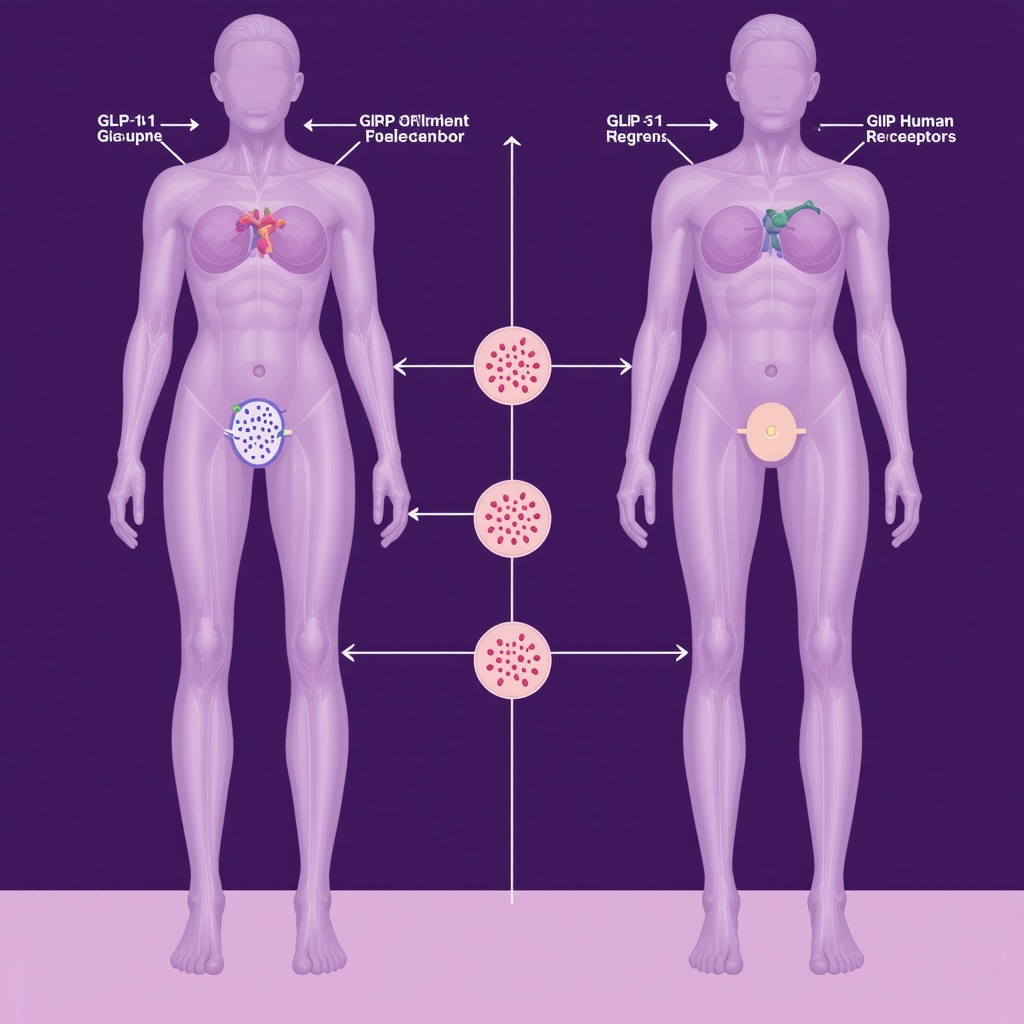Embracing Injectable Therapies: The New Frontier in Medical Weight Loss
In 2025, the landscape of obesity management is increasingly shaped by injectable weight loss medications, marking a significant paradigm shift from conventional oral therapies. These medications, primarily glucagon-like peptide-1 (GLP-1) receptor agonists and emerging dual agonists, harness intricate metabolic pathways to promote sustainable fat loss by modulating appetite, insulin sensitivity, and energy expenditure. Their clinical efficacy, backed by rigorous trials published in leading endocrinology journals, underscores the transformative potential for patients struggling with obesity and related metabolic disorders.
Pharmacodynamics and Clinical Nuances: Decoding Leading Injectable Options
Semaglutide and Tirzepatide: Dual Agonists Reshaping Fat Loss Mechanisms
Semaglutide, a GLP-1 receptor agonist, has established itself as a cornerstone injectable therapy by significantly reducing appetite and enhancing glycemic control. In contrast, Tirzepatide, a novel dual GLP-1 and glucose-dependent insulinotropic polypeptide (GIP) receptor agonist, offers a multifaceted approach that synergistically optimizes metabolic regulation. Comparative analyses reveal Tirzepatide’s superior efficacy in weight reduction, albeit with nuanced differences in tolerability profiles, necessitating personalized treatment decisions informed by patient-specific metabolic phenotypes and comorbidities (semaglutide vs tirzepatide detailed comparison).
Emerging Injectable Candidates: Beyond GLP-1 Paradigms
Beyond these frontrunners, investigational injectables targeting melanocortin receptors and amylin pathways are entering clinical trials, promising alternative mechanisms for appetite suppression and energy homeostasis enhancement. These developments reflect an evolving therapeutic arsenal that addresses the heterogeneity of obesity pathophysiology.
How Do Injectable Weight Loss Medications Integrate Into Comprehensive Treatment Plans?
Injectable medications are most effective when incorporated into multidisciplinary weight management strategies that include nutritional counseling, behavioral therapy, and physical activity optimization. Their role extends beyond isolated pharmacotherapy to serve as catalysts for lifestyle modification adherence and metabolic improvements. Physician-guided customization ensures that dosing regimens and adjunct interventions align with patient goals and safety considerations (doctor-prescribed weight loss plans personalized strategy).
Addressing Safety and Patient Selection: Navigating Risks in Injectable Therapies
While injectable weight loss medications demonstrate robust efficacy, vigilance regarding adverse events such as gastrointestinal disturbances, pancreatitis risk, and potential thyroid C-cell effects remains paramount. Careful patient selection, including assessment of contraindications and monitoring protocols, is critical to optimize risk-benefit ratios. Emerging safety data from long-term real-world studies continue to refine clinical guidelines (FDA-approved weight loss treatments safety overview).
What Are the Key Considerations for Patients Contemplating Injectable Weight Loss Medications in 2025?
Patients must evaluate injectable options in the context of their metabolic profile, treatment history, and lifestyle compatibility. Discussions with healthcare providers should encompass expectations for weight loss magnitude, potential side effects, administration logistics, and cost implications. Telemedicine platforms have enhanced accessibility to expert consultations, enabling personalized prescription and monitoring remotely (telemedicine weight loss treatment access).
Explore advanced insights on the comparative efficacy and safety profiles of injectable therapies in our detailed Top Injectable Weight Loss Medications for Effective Fat Loss resource and contribute your expert perspectives to this evolving field.
According to a 2023 meta-analysis published in The Lancet Diabetes & Endocrinology, GLP-1 receptor agonists yield an average weight reduction of 10-15% over placebo, with Tirzepatide showing even greater promise in clinical endpoints (The Lancet Diabetes & Endocrinology study on GLP-1 weight loss).
Optimizing Injectable Weight Loss: Combining Pharmacotherapy with Lifestyle Interventions
While injectable medications like Semaglutide and Tirzepatide lead the charge in effective fat loss, their integration into comprehensive care plans amplifies outcomes. Clinicians emphasize the synergy of these agents with tailored nutritional plans, cognitive-behavioral therapy, and consistent physical activity to sustain long-term weight management success. For example, dose titration schedules adapted to patient tolerance can mitigate side effects, improving adherence and maximizing fat loss potential (customized doctor-prescribed weight loss plans).
How Can Emerging Dual-Agonists Revolutionize Personalized Weight Loss Therapies?
The advent of dual-agonists that target multiple metabolic receptors signals a new era in obesity pharmacotherapy. Agents like Tirzepatide harness the complementary actions on GLP-1 and GIP receptors, offering enhanced appetite suppression and improved insulin sensitivity. However, the challenge lies in personalizing treatment based on genetic, phenotypic, and lifestyle factors to optimize efficacy and minimize adverse effects. Ongoing research explores biomarker-driven approaches to identify ideal candidates for specific injectable combinations, paving the way for precision medicine in weight management (semaglutide vs tirzepatide ultimate showdown).

Ensuring Safety: Monitoring and Managing Adverse Effects in Injectable Treatments
Despite their efficacy, injectable weight loss medications require vigilant monitoring for gastrointestinal symptoms, rare pancreatitis, and possible thyroid-related concerns. Physicians must engage in thorough pre-treatment evaluations, including medical history and risk factor assessments. Continuous patient education on recognizing early signs of adverse reactions is essential. Furthermore, integrating telemedicine follow-ups facilitates timely interventions and dose adjustments, enhancing the safety profile of these therapies (telemedicine weight loss treatment for fast prescription access).
Regulatory Perspectives and Future Directions in Injectable Weight Loss Medications
Regulatory agencies such as the FDA maintain rigorous evaluation protocols to ensure injectable weight loss drugs meet safety and efficacy thresholds. Recent approvals reflect a growing acceptance of combination therapies and novel molecular targets. Looking ahead, research focuses on long-term cardiovascular outcomes and metabolic benefits beyond weight loss, positioning these medications as integral components of holistic obesity management strategies (NCBI review on obesity pharmacotherapy advances).
Engage with our expert community by sharing your experiences or questions about injectable weight loss medications in the comments below. For a deeper dive, explore our comprehensive guide on doctor-prescribed weight loss plans tailored for medical solutions to customize your fat loss journey.
Precision Medicine in Injectable Weight Loss: Tailoring Treatments to Genetic and Phenotypic Profiles
The integration of genomics and phenotyping into obesity pharmacotherapy represents a revolutionary shift toward precision medicine. Injectable agents such as GLP-1 and dual agonists are no longer considered “one-size-fits-all” solutions but rather components of individualized regimens responsive to patient-specific molecular and metabolic signatures. Cutting-edge research delineates genotypic markers—such as single nucleotide polymorphisms influencing incretin receptor sensitivity—that predict responsiveness to agents like Semaglutide and Tirzepatide, enabling clinicians to stratify patients effectively and optimize therapeutic outcomes.
This paradigm shift is underscored by emerging biomarker panels that assess insulin resistance phenotypes, appetite regulation pathways, and adipose tissue inflammation status. By leveraging these diagnostics, clinicians can discern which patients will benefit most from particular injectable modalities, thereby minimizing trial-and-error prescribing and reducing adverse effect incidence.
What Are the Current Challenges and Solutions in Biomarker-Driven Personalization of Injectable Therapies?
While the promise of biomarker-guided therapy is compelling, several challenges impede its widespread clinical adoption. These include the heterogeneity of obesity pathophysiology, limited accessibility to high-throughput genetic testing, and the need for robust clinical validation of predictive biomarkers. However, solutions are emerging through multidisciplinary collaborations that integrate endocrinology, molecular biology, and bioinformatics. For example, machine learning algorithms are being developed to analyze complex datasets, identifying predictive patterns that inform therapy selection. Furthermore, initiatives to standardize biomarker panels and incorporate them into electronic health records are underway, facilitating streamlined clinical decision-making.
Innovative Delivery Systems: Enhancing Patient Compliance and Therapeutic Efficacy
Beyond pharmacodynamics, the mode of delivery significantly influences patient adherence and overall success of injectable therapies. Novel delivery platforms—such as sustained-release biodegradable microspheres and microneedle patches—are under investigation to reduce injection frequency and discomfort, thereby improving the patient experience. These technologies aim to maintain stable plasma drug concentrations, circumventing peaks and troughs that can exacerbate side effects.
Moreover, smart injection devices equipped with digital adherence tracking and dose reminders are gaining traction. These devices integrate with mobile health applications, enabling real-time monitoring by healthcare providers and facilitating prompt intervention when adherence lapses are detected. This convergence of pharmacology and digital health exemplifies the future direction of obesity treatment paradigms.
Economic Considerations and Accessibility: Navigating the Cost-Efficacy Landscape
Despite the clinical promise of injectable weight loss medications, economic factors remain a critical barrier to equitable access. High costs associated with these therapies often limit their availability to insured populations, creating disparities in obesity management outcomes. Health economists emphasize the importance of cost-effectiveness analyses that incorporate long-term benefits such as reduced cardiovascular events and diabetes incidence.
Policy strategies—such as value-based insurance design and patient assistance programs—are increasingly advocated to mitigate financial impediments. Additionally, the expansion of telemedicine platforms has demonstrated potential in reducing indirect costs by facilitating remote consultations and follow-up, thus enhancing adherence and clinical monitoring.
For a comprehensive evaluation of cost-efficacy frameworks and emerging policy interventions, the Health Affairs 2023 review on economic models in obesity pharmacotherapy offers critical insights.
Integrating Injectable Therapies Within Multimodal Behavioral Interventions: A Biopsychosocial Approach
Injectable medications achieve maximal efficacy when embedded within holistic behavioral frameworks addressing psychological, social, and environmental determinants of obesity. Cognitive-behavioral therapy (CBT), motivational interviewing, and habit formation techniques synergize with pharmacologic appetite regulation, enhancing sustainable lifestyle change.
Emerging evidence supports the use of digitally delivered behavioral interventions concurrent with injectable therapy to maintain engagement and address barriers such as emotional eating and stress-induced relapse. Tailored coaching and peer support networks accessible via mobile platforms are proving instrumental in reinforcing adherence and fostering resilience.
Explore how these integrative approaches can amplify your weight loss journey by visiting our detailed guide on doctor-prescribed weight loss plans tailored for medical solutions. Engage with our expert community and share your experiences to contribute to advancing patient-centered care in obesity management.
Cutting-Edge Biomarkers and Genomic Insights Transforming Injectable Weight Loss Approaches
The evolution of injectable weight loss therapies transcends pharmacology alone, increasingly incorporating genomic and proteomic data to refine patient stratification. Recent studies identify polymorphisms in incretin receptor genes and adipokine signaling pathways that modulate individual responsiveness to GLP-1 and dual-agonist agents. By integrating multi-omic profiles, endocrinologists can develop predictive algorithms that anticipate efficacy and adverse event susceptibility, thereby tailoring regimens with unprecedented precision.
How Are Machine Learning Models Enhancing Personalization of Injectable Weight Loss Treatments?
Machine learning frameworks are at the forefront of transforming raw clinical and molecular data into actionable treatment pathways. These models analyze vast datasets—including genetic variants, metabolic parameters, and lifestyle factors—to classify patients into subgroups most likely to benefit from specific injectable therapies. For example, supervised learning algorithms have demonstrated success in predicting optimal dose titration schedules to minimize gastrointestinal side effects while maximizing weight loss efficacy. This data-driven approach reduces empirical guesswork and accelerates individualized care.
Moreover, integration of electronic health records with mobile adherence data enables dynamic treatment adjustments in real-time, enhancing both safety and outcomes. Such innovations underscore the convergence of digital health and pharmacotherapy as a critical axis in obesity management.
Next-Generation Delivery Technologies: Minimizing Barriers and Augmenting Patient-Centered Care
Emerging delivery platforms are revolutionizing the administration of injectable weight loss medications, focusing on patient convenience and sustained pharmacokinetics. Biodegradable polymer-based sustained-release formulations permit extended dosing intervals, mitigating injection fatigue and improving adherence. Concurrently, microneedle patch systems offer a virtually painless alternative with enhanced skin permeability, potentially expanding use among needle-averse populations.
Additionally, connected smart injection devices equipped with biosensors monitor injection site reactions and pharmacodynamic responses, transmitting data to clinicians for proactive management. These technologies not only optimize therapeutic efficacy but also empower patients through real-time feedback and support.
Economic and Policy Innovations: Bridging Access Gaps in Injectable Obesity Pharmacotherapy
Despite clinical advancements, financial hurdles remain a critical challenge for widespread adoption of injectable weight loss therapies. Recent health policy analyses advocate for innovative reimbursement models that align payment with demonstrated long-term metabolic and cardiovascular benefits rather than short-term weight loss metrics alone. Value-based insurance designs incentivize adherence by reducing out-of-pocket costs contingent on clinical milestones.
Patient assistance programs and telehealth expansion further alleviate access disparities, particularly in underserved regions. The intersection of economic modeling and policy reform is essential to democratize these breakthrough therapies and optimize public health impact.
For comprehensive insights into economic frameworks and policy trajectories, refer to the Health Affairs 2023 review on economic models in obesity pharmacotherapy.
Integrating Psychobehavioral Interventions with Pharmacotherapy for Sustained Weight Loss
Injectable therapies achieve their maximal potential when synergistically combined with advanced behavioral interventions addressing the biopsychosocial dimensions of obesity. Cognitive-behavioral therapy (CBT), motivational interviewing, and habit reversal training complement pharmacologic appetite modulation by targeting emotional eating, stress responses, and environmental triggers.
Innovative digital platforms deliver tailored coaching, peer support, and relapse prevention strategies in conjunction with injectable regimens, fostering long-term adherence and resilience. These integrative models highlight the necessity of multidisciplinary frameworks that encompass both physiological and psychological determinants.
Unlock the full potential of injectable weight loss therapies by exploring our detailed expert resources and engaging with our community to share insights, challenges, and success stories. Together, we can advance personalized obesity management in 2025 and beyond.

Expert Insights & Advanced Considerations
Precision Medicine as the Cornerstone of Injectable Weight Loss Success
The integration of genomic and phenotypic profiling in tailoring injectable weight loss therapies represents a transformative shift in obesity management. Recognizing patient-specific molecular markers allows clinicians to optimize efficacy and safety, moving beyond the traditional trial-and-error paradigm. This approach not only enhances therapeutic outcomes but also reduces adverse effects, fostering higher adherence and satisfaction.
The Synergistic Role of Digital Health Technologies in Therapy Delivery and Monitoring
Emerging smart injection devices and telemedicine platforms are redefining patient engagement by enabling real-time adherence tracking, dose adjustments, and side effect management. These innovations facilitate personalized care pathways and empower patients, ultimately improving long-term weight loss maintenance and clinical safety.
Economic and Policy Innovations as Catalysts for Widespread Adoption
Cost remains a major barrier to access for injectable weight loss medications. However, value-based insurance designs and patient assistance programs are promising mechanisms to democratize these therapies. Integrating economic considerations with clinical benefits ensures sustainable healthcare models that can support broader patient populations.
Multimodal Behavioral Integration: The Biopsychosocial Paradigm
Injectable therapies reach their full potential when combined with evidence-based behavioral interventions such as cognitive-behavioral therapy and motivational interviewing. Addressing psychological and social determinants of obesity enhances adherence and mitigates relapse, emphasizing the necessity of multidisciplinary care teams.
Future Directions: Expanding the Therapeutic Arsenal with Novel Targets and Delivery Systems
Investigational agents targeting alternative metabolic pathways, coupled with innovative delivery systems like microneedle patches and sustained-release formulations, promise to improve patient convenience and broaden treatment options. These advancements will likely redefine standards of care in the near future.
Curated Expert Resources
- “Semaglutide vs Tirzepatide: The Ultimate Weight Loss Showdown” – A comprehensive comparison detailing pharmacodynamics, efficacy, and safety profiles essential for personalized therapy decision-making. (Read more)
- Health Affairs 2023 Review on Economic Models in Obesity Pharmacotherapy – Offers critical insights into cost-effectiveness frameworks and policy innovations facilitating equitable access to injectable therapies. (Explore the study)
- FDA-Approved Weight Loss Treatments: Latest Injection Options for 2025 – An authoritative guide on current regulatory approvals and emerging injectable medications shaping clinical practice. (Discover more)
- Doctor-Prescribed Weight Loss Plans Tailored for Medical Solutions – Insights into customizing injectable therapies within multidisciplinary care for sustained fat loss success. (Learn more)
- Telemedicine Weight Loss Treatment Access Prescription Medications Safely – Explores how digital platforms enhance accessibility and monitoring of injectable weight loss regimens. (Read the article)
Final Expert Perspective
The evolving landscape of injectable weight loss medications in 2025 underscores a paradigm shift toward precision medicine, integrative behavioral strategies, and technological innovation. These therapies, when expertly tailored and combined with supportive care frameworks, offer unprecedented opportunities for sustainable fat loss and metabolic health improvement. Navigating economic and access challenges remains critical to realizing their full potential across diverse patient populations.
For professionals committed to advancing obesity pharmacotherapy, engaging with emerging research, multidisciplinary collaboration, and patient-centered technology is paramount. We invite you to deepen your expertise by exploring our extensive resources on doctor-prescribed weight loss plans tailored for medical solutions and to contribute your insights by connecting with our expert community. Together, we can shape the next frontier in effective, personalized obesity treatment.
